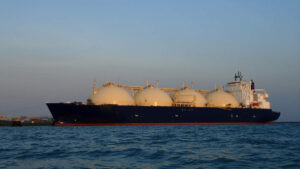Goldman Sachs cranks up oil price forecast to US$125/bbl

Picture: Getty Images
For all that oil prices have breached the US$100 per barrel barrier, with the benchmark Brent crude climbing above US$105/bbl late last week, gains beyond that point have been remarkably restrained to date.
A large part of this is due to the decision to withhold sanctions on Russian oil and gas exports, a decision rooted in a desire to keep already high prices of the two energy commodities from rising further.
However, Goldman Sachs – having seen the fulfilment of its US$105/bbl prediction – is now flagging that crude oil prices could soar to US$125/bbl by May if the Russian invasion of Ukraine results in a “supply shock”.
Brent crude is currently trading at US$103.15/bbl.
Analysts from the giant investment bank warned that the risk of sanctions hitting Russian energy suppliers, Germany’s move to the put the critical Nord Stream 2 pipeline from Russia on ice, and the chance that the US fails to reach a nuclear deal with Iran were all factors that could hold down the supply of oil.
Energy consultancy Rystad Energy believes that US$130/bbl oil is on the horizon though it did not specify a timeframe when this would occur.
All these of course is still shy compared to JPMorgan’s prediction that oil prices could climb as high as US$150/bbl – though that prediction was made in late January, so who knows what price the bank thinks crude can climb to now?
Of gas pipelines and making a stance
Meanwhile, European gas prices have soared following the invasion. Hardly surprising when Russia provides 40% of Europe’s gas supplies.
Gas supplies from Russia through Ukraine have remained uninterrupted so far but the ever-present threat that supplies might be cut has lent greater urgency to efforts to reduce or even end this dependency.
Already, Germany has moved to halt the process of certifying the 1,230km Nord Stream 2 pipeline between the two countries that has the ability to supply 55 million cubic metres of gas per annum – a 10th of Europe’s gas consumption.
Speaking to reporters, German foreign minister Annalena Baerbock said last week that while cancelling the agreement was difficult, it was important to accept consequences as a show of support for a free and democratic Ukraine.
But finding a new source of gas or energy isn’t a simple solution.
Across Europe, gas production has been in a state of steady decline for some time now and while Norway, the only European country that still hosts significant gas resources, has committed to maintaining maximum gas production, its ability to replace Russia is limited.
Importing liquefied natural gas is one possible option, however most supplies are locked up under long-term contracts, leaving Europe to fight for spot cargoes.
Other energy alternatives will take time to realise whether they be uranium, which raises other questions, and/or renewable energy married with energy storage.
Related Topics

UNLOCK INSIGHTS
Discover the untold stories of emerging ASX stocks.
Daily news and expert analysis, it's free to subscribe.
By proceeding, you confirm you understand that we handle personal information in accordance with our Privacy Policy.








